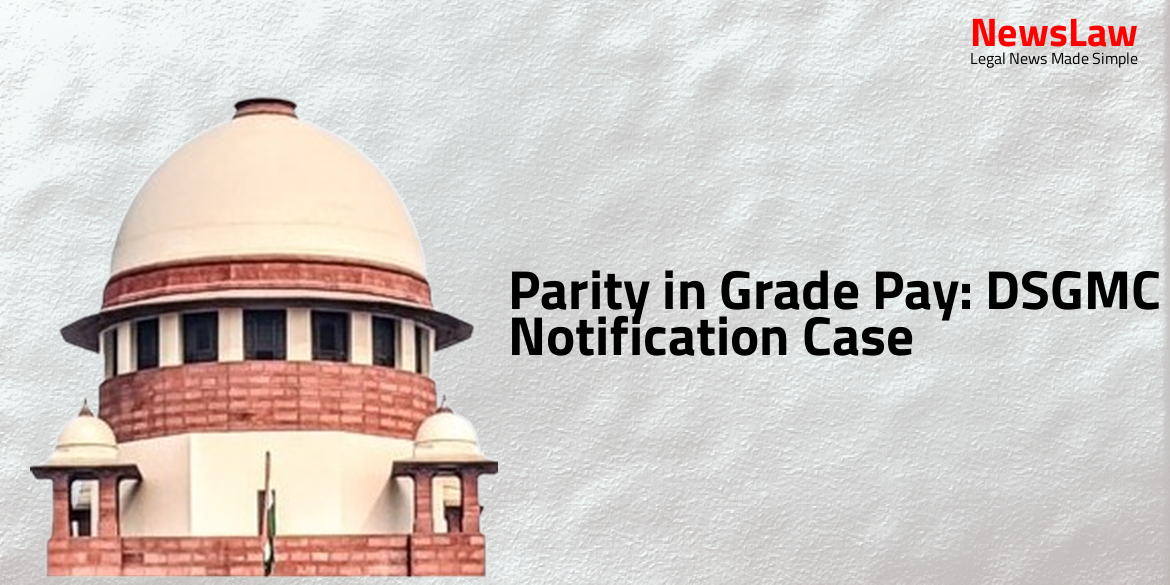A landmark Supreme Court judgment has been delivered in the case involving a land lease dispute between MCGM and SevenHills. The ruling provides clarity on the rights and obligations of both parties involved in the contentious issue. Let’s delve into the details of this significant legal development.
Facts
- MCGM filed an application claiming to be declared as a Financial Creditor and a Member of the Committee of Creditors.
- MCGM stipulated conditions for the resolution plan, including completion of the hospital project in a time-bound manner, providing 20% beds to the economically weaker sections, and clearing its claims.
- SevenHills owed MCGM a significant amount as per the contract.
- MCGM appealed against the NCLAT’s rejection of its plea regarding the resolution plan approved by NCLT.
- MCGM opposed the resolution plan during the proceedings, citing compliance with the MMC Act.
- MCGM issued a show cause notice to terminate the contract with SevenHills due to defaults in lease rent payments.
- The resolution plan projected a substantial infusion of funds by SNMC for SevenHills.
- The lack of response to MCGM’s show cause notice allowed for termination of the agreement according to the Code.
- MCGM appealed to the Appellate Tribunal against NCLT’s order regarding the lease deed conditions not being complied with.
- MCGM argued that since the lease conditions were not met, there was no interest in the land for the Corporate Debtor.
- Another argument was that the CIRP period had lapsed by the end of the extended time period.
- NCLT found that the amount offered in the resolution plan exceeded the value of liquidation of the Corporate Debtor.
- The resolution plan met the requirements of relevant sections and regulations and did not violate Section 29A provisions.
- The plan provided for substantial payments to both financial and operational creditors, which was unanimously approved by the CoC.
Also Read: Legal Analysis of Claim for Loss of Profit in Delayed Contract
Arguments
- MCGM argued that no lease deed was executed in favor of the Corporate Debtor, stating they were the rightful owner of the land.
- The RP argued that MCGM had consented to the resolution plan before the NCLT and the Appellate Tribunal.
- NCLAT accepted MCGM’s acceptance of the revised resolution plan and found no basis to interfere with the NCLT’s decision.
- The Adjudicating Authority highlighted that MCGM’s conflicting stands during hearings resulted in their contentions being rejected.
- MCGM issued a show cause notice to terminate the contract, indicating they must approve any revised plan involving their properties before the plan could be binding.
- It was argued that the resolution plan did not transfer MCGM’s assets to the resolution applicant SNMC, and that the terms of the original contract had been violated.
- MCGM’s objections regarding the expiry of the 270-day period were dismissed as the Resolution Professional’s application was made within the stipulated time.
- MCGM’s contentions that no leasehold rights were created in favor of the Corporate Debtor conflicted with their earlier admissions to the NCLT.
- MCGM was invited to CoC meetings and required resolution applicants to submit plans resolving any disputes with MCGM to safeguard their interests.
- MCGM cannot hold the entire CIRP of the Corporate Debtor to ransom without raising objections on the validity of the resolution plan.
- Disputes with MCGM regarding the lease of the underlying land do not affect the validity of the resolution plan.
- SNFC never represented that it would mortgage or obtain a loan without the necessary permissions from MCGM.
- The resolution plan is unconditional and not contingent on resolving disputes with MCGM.
- SNMC’s unconditional assurance to repay all dues to MCGM was a key aspect of the resolution plan.
- The plan approved provided the best solution for the financial struggles of the Corporate Debtor.
- Negotiations with MCGM were ongoing, but the resolution plan remained unconditional and independent of the outcome of such negotiations.
- The resolution plan’s provisions did not suggest any conditionality based on settlement with MCGM.
- The finality of the resolution plan binds MCGM as a stakeholder in the Corporate Debtor.
Also Read: Public Declaration Requirement in Marriage under Hindu Marriage Act
Analysis
- The argument that huge amounts were spent to reclaim land is fallacious, as the expenses were for dredging a canal, not for reclaiming land.
- The MOUs executed by the Appellants with GMB and State Government did not grant any rights to the Appellants, and they bore all the expenses.
- Section 35(1) of the Gujarat Maritime Board Act requires prior permission from GMB for reclamation within its limits.
- The Resolution Plan in question impacts MCGM’s plans for public health amenities and should adhere to MMC Act requirements.
- The resolution plan approved by NCLT must comply with Section 92 and 92A of the MMC Act for any dealings involving MCGM’s properties.
- The resolution plan proposes the creation of charges or securities on MCGM’s properties, necessitating MCGM’s approval.
- Any permissions granted under Section 35(1) specifically mention the grant under that section, as seen in a dated letter.
- MCGM’s objections and concerns regarding treatment of its lands in the resolution plan were overruled by NCLT and NCLAT.
- MCGM reserved its rights under the contract with SevenHills, ensuring its properties could not be affected by the resolution plan.
- Section 238 cannot override MCGM’s control over its properties in the context of the resolution plan.
- Section 7 of the Code allows for the mortgage and/or creation of a charge on the Schedule Property by SHCL during the lease period or prior to it.
- Section 238 of the Code overrides any inconsistencies with other laws, enabling the provisions of the Code to have effect.
- Clause 2(i) of the agreement sets the minimum lease rent for SHCL and additional payment terms.
- Clause 5 of the agreement permits SHCL to mortgage and/or create a charge on the Schedule Property with approval from the Owner.
- Clause 15(a) stipulates the lease period for SHCL to enter into a Lease Deed for 60 years upon completion of the project period.
- The agreement allows SHCL to seek permission to mortgage the property from the Municipal Commissioner for financial assistance. If approval is not received within two months, it is deemed approved.
- The Rule in Taylor v. Taylor, which states that if a statute prescribes a specific method for exercising power, any other method is prohibited.
- Cases like State of U.P. v. Singhara Singh and Duncans Industries v. A.J. Agrochem have upheld this rule.
- The power to issue directions for insolvency proceedings under the Banking Regulation Act is vested in the RBI, subject to approval from the Central Government.
- Inconsistency with Section 238 of the Code would make its provisions prevail.
- The principle from Nazir Ahmad v. Emperor that actions must be done as prescribed by statute has been widely accepted.
- There can be no estoppel against express provisions of law.
- Specific provisions in the Act prevent the Mandi Samiti from transferring property without approval.
- The impugned order and the order of the NCLT have been deemed not valid and are set aside.
- This court has provided reasons for holding the mentioned orders to be invalid.
- The decision to set aside the orders is based on the evaluation of the reasons provided.
- By setting aside the orders, this court has effectively nullified their legal effect.
Also Read: OCI Cardholders’ Rights and Retroactive Notifications
Decision
- The lease period of 60 years shall commence from the date of completion of the Project period.
- SHCL must complete the construction of the hospital building within the project period of 60 months excluding monsoon.
- In case of project completion delay by SHCL without force majeure conditions, a penalty equivalent to 25% of Lease Rent will be charged for the delay period.
- The Contract Agreement is to be read in conjunction with the Lease Deed to be entered into by both parties upon completion of the project period.
- MCGM is responsible for issuing the Project Completion Certificate on written application by SHCL after project completion, unless delays are beyond SHCL’s control.
- SHCL needs to submit a work program with defined milestones for the project.
- The progress of the work must strictly adhere to the approved construction program submitted by SHCL and approved by the Commissioner.
- SHCL must complete the entire project and open the facility to public use within the approved time limit.
- Upon completion of the project, the Owner will issue a ‘Project Completion Certificate’ to SHCL.
Case Title: MUNICIPAL CORPORATION OF GREATER MUMBAI (MCGM) Vs. ABHILASH LAL
Case Number: C.A. No.-006350 / 2019



